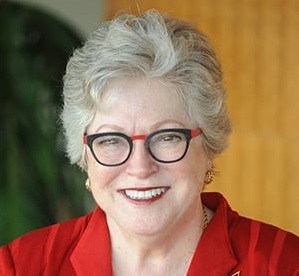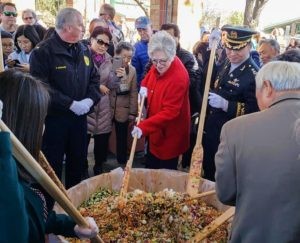 We love diversity, at least theoretically. When we construct a task force, a committee, a roster of speakers, we try to make sure we have one of every kind. We take unseemly pride in getting the ethnic quotas just right – at least in those places where there is such diversity. Sadly, tribal divisions tend to keep people too separate even while demographics continue to shift, with a white minority in the not too distant future.
We love diversity, at least theoretically. When we construct a task force, a committee, a roster of speakers, we try to make sure we have one of every kind. We take unseemly pride in getting the ethnic quotas just right – at least in those places where there is such diversity. Sadly, tribal divisions tend to keep people too separate even while demographics continue to shift, with a white minority in the not too distant future.
I attended an interesting event last weekend where I was a distinct minority. Downtown Overland Park, Kansas, was teeming with people on Saturday morning. Families, many with babies in strollers, crowded under the clock tower, a distinctive landmark, for the festivities. The Korean Association of Kansas City was celebrating the 100th anniversary of Koreans’ immigration to Kansas.
Regrettably, few non-Koreans were in attendance.
The morning began with a parade, replete with beautiful traditional dress. Older and younger participated, and it was a dignified walk together. The crowd observing the procession understood the solemnity of the occasion and stood in respectful silence. Immigration does not come without pain and although few of the earliest generation remain, their memory is dear.
“Xenophobia is rampant in our time.”
The problem was that there were actually more in the parade than in the audience watching.
Then came the big event: rice mixing, a communal effort to celebrate common cause. Before the ceremony began, I noted how proud Central Baptist Theological Seminary, where I serve as president, is to have Koreans as over half of its student body. Then I offered this prayer:
O God, you are ever calling people to leave their land and go to a new place. It is as old as the story of Abraham and Sarah. Not only do you call to leave, you accompany on the journey, and then you meet your people in the new land. You desire that the nations dwell in peace and learn from each other.
Thank you for your care of these faithful Koreans who journeyed to a new land and have made it better through their presence. Thank you for watching over them and prospering the work of their hands. Thank you for your providence in their lives, always faithfully accompanying them.
We pray in your blessed name, Amen.
Organizers presented each of us with white gloves and a long wooden shovel to mix the ingredients of rice, vegetables, meat and spices – enough to feed 300 people. The huge pot was about four feet in diameter, and the food was over two feet deep. Looking a little like Minnie Mouse in my gloves, I was among several mixers honored to participate. There was a Korean representative from the Chicago office of immigration, an officer in the Korean army, the chief of police for Overland Park (the other Euro-American) and leaders of the Korean Association. Only a handful of Americans of European or African or Latinx descent were there to witness the formality.
 Mixing the massive amount of ingredients was surprisingly challenging work, and I was glad for those with stronger muscles doing more of the lifting and stirring. I tried to avoid poking my fellow mixers in the eye as we wielded our implements in close proximity. I did make sure that the purple cabbage in front of me was generously integrated into the whole pot.
Mixing the massive amount of ingredients was surprisingly challenging work, and I was glad for those with stronger muscles doing more of the lifting and stirring. I tried to avoid poking my fellow mixers in the eye as we wielded our implements in close proximity. I did make sure that the purple cabbage in front of me was generously integrated into the whole pot.
It was for me an image of the Body of Christ working together. It was colorful and held significant symbolic meaning. It also spoke of abundant provision from the accompanying God.
I give thanks for the Korean community of Kansas City, about 5,000 strong. Their faithful presence brings a special flavor to the larger community.
The recent festivities reminded me that diversity is not punishment (as an older reading of the Babel story concluded), but is God’s idea of beauty and collaboration. The “confusion of tongues” had much more to do with scattering people so that unique cultures could interface around the globe. Interestingly the “Tower of Babel” story follows Genesis 10 which records the “Table of Nations.” Diversity is a part of God’s intention for the world, as “is evident from the marvelously pluriform character of God’s creation in the first place,” in the words of Terrence Fretheim.
Practicing authentic welcome remains a challenge as we tend to gravitate toward those like us. We are fearful of saying the wrong thing, put charitably; or, we really do not care to de-center ourselves for the sake of learning another’s cultural uniqueness, perhaps put more honestly.
Xenophobia is rampant in our time.
“The gathering reminded me that diversity is not punishment, but is God’s idea of beauty and collaboration.”
The challenge is as old as appreciating the different parts of the body, as Paul exhorted the Corinthians. We cannot say “we have no need” of any part of what God has called good. Appreciating the patterns of others draws us closer, even in the face of nationalism and racism.
In a sense, the whole world is God’s mixing bowl, and we are part of the ingredients to feed others.
